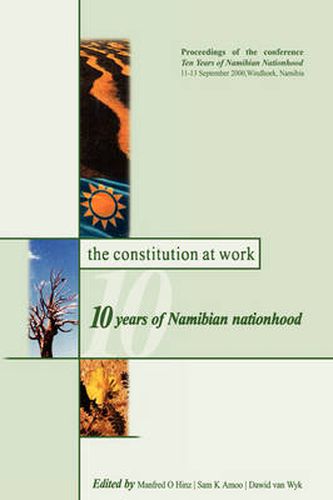Readings Newsletter
Become a Readings Member to make your shopping experience even easier.
Sign in or sign up for free!
You’re not far away from qualifying for FREE standard shipping within Australia
You’ve qualified for FREE standard shipping within Australia
The cart is loading…






This title is printed to order. This book may have been self-published. If so, we cannot guarantee the quality of the content. In the main most books will have gone through the editing process however some may not. We therefore suggest that you be aware of this before ordering this book. If in doubt check either the author or publisher’s details as we are unable to accept any returns unless they are faulty. Please contact us if you have any questions.
This volume brings together papers from a conference convened by the University of Namibia on the constitutional and human rights record of the government of Namibia since 1990. It was held against the background of the development of the written constitution, and principles of human rights therein, and in recognition of the importance of interface between academics and policymakers. Many papers consider the land reform question, the laws of expropriation in Namibia and other countries of Southern Africa, and developments and vicissitudes thus far. They show how land reform policies in Namibia are being conducted within the spirit of the constitution and advocate such an approach. The editors assess the success of the independent judiciary against the prerogative to create balance and respect between the executive, the juciciary and wider society.Other perspectives on the subject, local, regional and international, include: governance in Namibia and the international environment; traditional authorities; the African regional system of human rights protection; the values and spirit of the South African constitution; the principles for designing the constitution and policies of the EU; the constitutional prohibition on torture; sustaining peace and unity, and the integration of former freedom fighters into the Namibian Defence Force; gender and law reform; and press freedom and state practice.
$9.00 standard shipping within Australia
FREE standard shipping within Australia for orders over $100.00
Express & International shipping calculated at checkout
This title is printed to order. This book may have been self-published. If so, we cannot guarantee the quality of the content. In the main most books will have gone through the editing process however some may not. We therefore suggest that you be aware of this before ordering this book. If in doubt check either the author or publisher’s details as we are unable to accept any returns unless they are faulty. Please contact us if you have any questions.
This volume brings together papers from a conference convened by the University of Namibia on the constitutional and human rights record of the government of Namibia since 1990. It was held against the background of the development of the written constitution, and principles of human rights therein, and in recognition of the importance of interface between academics and policymakers. Many papers consider the land reform question, the laws of expropriation in Namibia and other countries of Southern Africa, and developments and vicissitudes thus far. They show how land reform policies in Namibia are being conducted within the spirit of the constitution and advocate such an approach. The editors assess the success of the independent judiciary against the prerogative to create balance and respect between the executive, the juciciary and wider society.Other perspectives on the subject, local, regional and international, include: governance in Namibia and the international environment; traditional authorities; the African regional system of human rights protection; the values and spirit of the South African constitution; the principles for designing the constitution and policies of the EU; the constitutional prohibition on torture; sustaining peace and unity, and the integration of former freedom fighters into the Namibian Defence Force; gender and law reform; and press freedom and state practice.